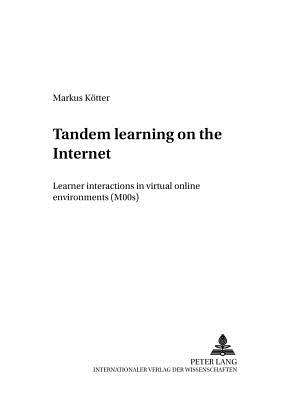The study investigates interactions between 29 tandem partners from a German and a North American university, who met twice a week in a text-based online environment that allowed them to communicate with each other in real time via a computer keyboard. The analysis focuses on learners' codeswitching, negotiation of meaning, error correction, and the use of specific spellings and punctuation.
The data suggest that most partners complied with the principle of reciprocity and that the non-threatening atmosphere of the MOO encouraged them to test their hypotheses about their L2. Moreover, the analysis revealed a noticeable increase in learners' awareness of the target language. All students frequently engaged in negotiation of meaning, but there was a conspicuous absence of corrective feedback.
| FindBook |
有 1 項符合
Tandem Learning on the Internet: Learner Interactions in Virtual Online Environments (Moos)的圖書 |
 |
Tandem Learning on the Internet: Learner Interactions in Virtual Online Environments (Moos) 作者:Kotter 出版社:Peter Lang Gmbh, Internationaler Verlag Der W 出版日期:2002-09-10 語言:英文 規格:平裝 / 306頁 / 普通級 |
| 圖書館借閱 |
| 國家圖書館 | 全國圖書書目資訊網 | 國立公共資訊圖書館 | 電子書服務平台 | MetaCat 跨館整合查詢 |
| 臺北市立圖書館 | 新北市立圖書館 | 基隆市公共圖書館 | 桃園市立圖書館 | 新竹縣公共圖書館 |
| 苗栗縣立圖書館 | 臺中市立圖書館 | 彰化縣公共圖書館 | 南投縣文化局 | 雲林縣公共圖書館 |
| 嘉義縣圖書館 | 臺南市立圖書館 | 高雄市立圖書館 | 屏東縣公共圖書館 | 宜蘭縣公共圖書館 |
| 花蓮縣文化局 | 臺東縣文化處 |
|
|
圖書介紹 - 資料來源:博客來 評分:
圖書名稱:Tandem Learning on the Internet: Learner Interactions in Virtual Online Environments (Moos)
內容簡介
作者簡介
The Author: Markus Kötter completed his studies in English and German in 1996. He then taught for a year at the University of Münster before he joined the British Open University in 1998 to coordinate the FLUENT project and other pilot studies into the use of audio-conferencing and -graphics systems in distance language learning and teaching. In 2001 he returned to Münster, where he currently teaches at the English department.
|











